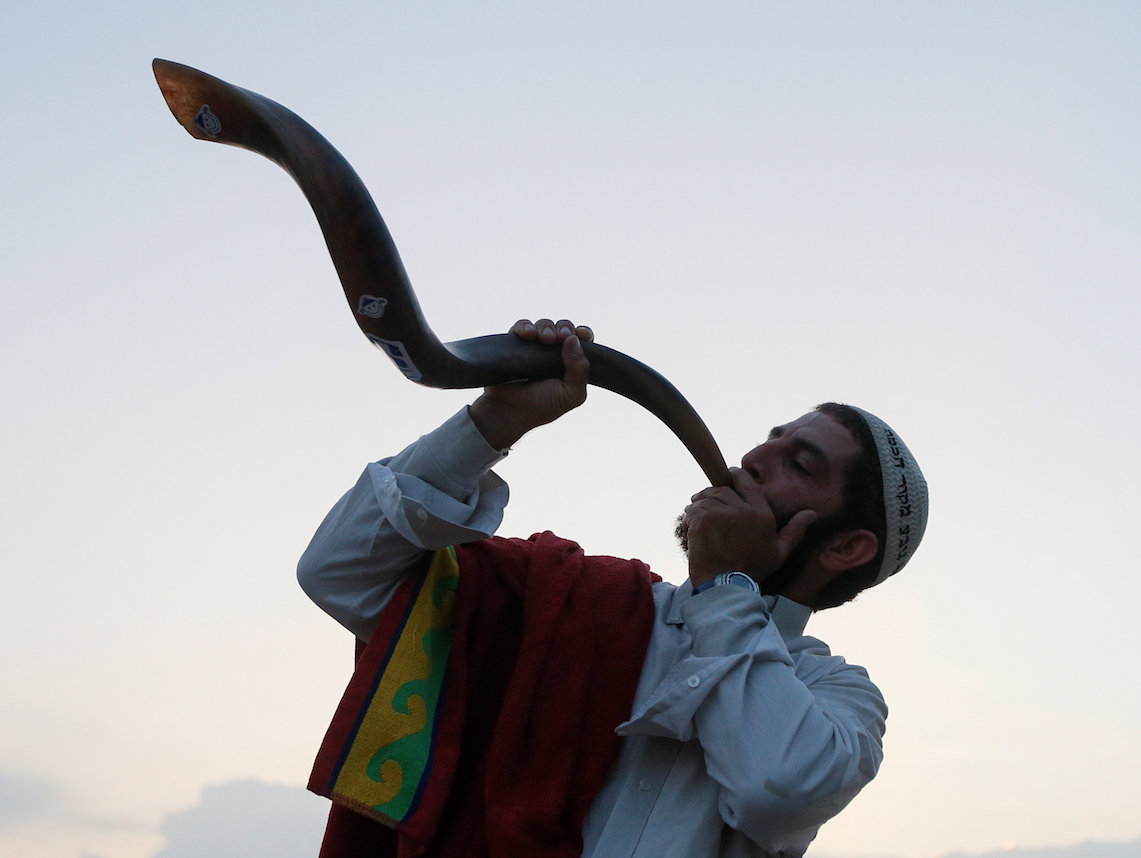 An ultra-Orthodox Jewish pilgrim blows a shofar, near the tomb of Rabbi Nachman of Breslov during the celebration of Rosh Hashanah holiday, the Jewish New Year, in Uman, Ukraine, Sept. 21, 2017. REUTERS/Valentyn Ogirenko
An ultra-Orthodox Jewish pilgrim blows a shofar, near the tomb of Rabbi Nachman of Breslov during the celebration of Rosh Hashanah holiday, the Jewish New Year, in Uman, Ukraine, Sept. 21, 2017. REUTERS/Valentyn Ogirenko I thought I understood the power of prayer, until I went to Uman.
Long before I reconnected with Judaism, I felt connected to God. It made no sense to me that a whole universe popped into existence out of nothing for no reason. I wanted to know our Creator. I tried many paths: philosophy, meditation, endurance sports, trance music, martial arts.
Here and there I’d catch hints of the Divine, but prayer was rarely part of the picture.
Twenty years ago, I returned to observant Judaism. My connection to prayer grew more solid as I put on tefillin and prayed every morning. But the moments that most moved me came when I was part of a rowdy congregation, especially with groups that danced and sang in the style of Reb Shlomo Carlebach.
Then, this fall, I traveled to Uman, Ukraine, to pray at the grave of Rebbe Nachman of Breslov. And I experienced another level.
Many people pray fervently, but the Breslovers, Rebbe Nachman’s Chasidic followers, add a personal component: hisbodedus. In short, they pour out their hearts as if they’re talking with a best friend. They do it out loud, every day, often with tears. Watching this, some people think they’re nuts. I don’t.
The gathering in Uman has been likened to a Jewish Burning Man festival. There’s certainly creativity, but the decadence and mind-altering substances are mostly limited to single-malt scotch. The Uman experience is intermittently loud, holy and contemplative.
Two moments stood out. Around the kever, the grave, of Rebbe Nachman, there’s a large synagogue where people pray around the clock, individually and in small groups. You hear cries of wrenching sincerity. I’ve visited the tombs of many holy figures in Israel. Each has its own energy. Rebbe Nachman’s was electric. At the tomb itself, I felt a rush of light coursing through me, and when I asked for guidance in knowing what to pray for, the answer came immediately.
As the Accidental Talmudist, I share what I love about Judaism with a large audience on a daily basis. So I prayed fervently that I should be a clean conduit for God’s light, neither obscuring it nor limiting it from a place of ego. This prayer now gives me strength before every live webcast.
The second moment was in a huge tent, singing a nigun (wordless prayer) with 2,500 guys in a tribal roar that must have pierced the firmament. It was ecstatic, rejuvenating, and I wanted it to go on forever. Every guy around me was my brother, and we were hugging strangers all day long.
Together, those moments aroused a sense of clarity.
In Uman, I didn’t just pray for life, health, love and success at work. Those blessings are crucial to everyone, and it’s good to ask for them, but all too often they are out of our control.
What I prayed for was clarity of purpose, strength to achieve it and open-minded humility in place of arrogant certainty. And as soon as I asked for help with those qualities, I felt the physical sensation of having my prayer answered.
In the 1984 film “The Karate Kid,” a bullied teenager asks a maintenance man and karate master, Mr. Miyagi, for a karate lesson, only to receive a can of car polish and a sponge.
“Wax on, wax off. Left hand, right hand,” Mr. Miyagi tells him.
The kid thinks he’s being bullied again, until those circular motions deflect an incoming punch. Then he realizes he’s been training all along, and that he can now protect himself with force and grace.
Prayer is like that. Our words and motions can easily become rote. We fulfill the commandment, but it’s only in moments of intensity that we feel its power. I experienced that intensity in Uman.
Alas, such heights are short-lived, and I have to pray regularly to keep developing those much-needed qualities. Yet, a trace of the Uman energy returned with me. I feel it now as I write these words. I feel it more when I pray.
That kind of prayer is action. It heals. It repairs. And it increases peace in the world.
Salvador Litvak shares his love of Judaism with his followers every day at facebook.com/accidentaltalmudist.






















 More news and opinions than at a Shabbat dinner, right in your inbox.
More news and opinions than at a Shabbat dinner, right in your inbox.